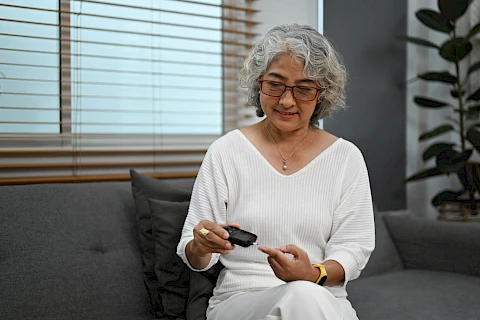
As we age, taking care of our health becomes increasingly important. For seniors living with diabetes, one area of focus should be eye health. Diabetic Macular Edema (DME) is a condition that can lead to significant vision loss, and it is closely linked to diabetes. Awareness of DME is vital for seniors and their caregivers, as monitoring and managing eye health can make a big difference in maintaining quality of life. Senior Helpers Boston North will highlight what seniors need to know about this condition.
What Is Diabetic Macular Edema?
Diabetic Macular Edema is a complication of diabetic retinopathy, which damages the blood vessels in the retina at the back of the eye. When these blood vessels leak fluid, it leads to swelling in the macula, the part of the eye responsible for sharp, straight-ahead vision.
This swelling can blur vision and make daily activities much more challenging. DME is not rare, especially among seniors with diabetes. It is a leading cause of vision loss in this demographic, affecting numerous individuals across the country.
Recognizing the Symptoms
Spotting the symptoms of DME early on can be key to managing the condition effectively. Some common symptoms include blurred vision, colors appearing washed out, and difficulty seeing at night or in low light. If you or a loved one experiences these symptoms, seek medical attention promptly to prevent further vision impairment. Early detection can significantly improve treatment outcomes, so it's crucial to be vigilant.
Why Get Regular Eye Exams?
For seniors with diabetes, having a comprehensive eye exam at least once a year is generally recommended. During these exams, eye care professionals can look for early signs of diabetic retinopathy and DME, allowing for timely intervention. Eye care experts are your partners in maintaining eye health and regular visits can help preserve your vision.
Managing Blood Sugar Levels
Controlling blood sugar levels is a powerful tool in preventing DME. High blood sugar can damage the tiny blood vessels in your eyes, so maintaining a healthy level is crucial. Tips for optimal blood sugar management include eating a balanced diet with fruits, vegetables, whole grains, and lean proteins, and staying active with regular physical activity. Always consult a doctor before starting a new fitness routine. Keep your blood sugar in check so you can reduce the risk of developing DME and other complications of diabetes.
Working With Your Eye Care Professional
Build a strong relationship with your eye care professional. They can provide guidance tailored to your needs and help monitor your eye health. Don't hesitate to ask questions during your appointments. These include what changes in your vision to be alert for and what steps you can take to protect your eyesight. Adhering to treatment plans and recommendations provided by your doctor can also help slow the progression of DME while protecting your vision.
Contact Senior Helpers Boston North for Eye Care Support
Understanding and managing Diabetic Macular Edema is part of taking control of your health as a senior with diabetes. Staying informed, recognizing symptoms early, attending regular eye exams, managing blood sugar levels, and working closely with your eye care professional can better protect your eyesight and maintain a healthy lifestyle. Senior Helpers Boston North supports seniors living in the North Shore, Merrimack Valley, Cape Ann, and surrounding areas through personalized senior care services. Contact us today to learn more!